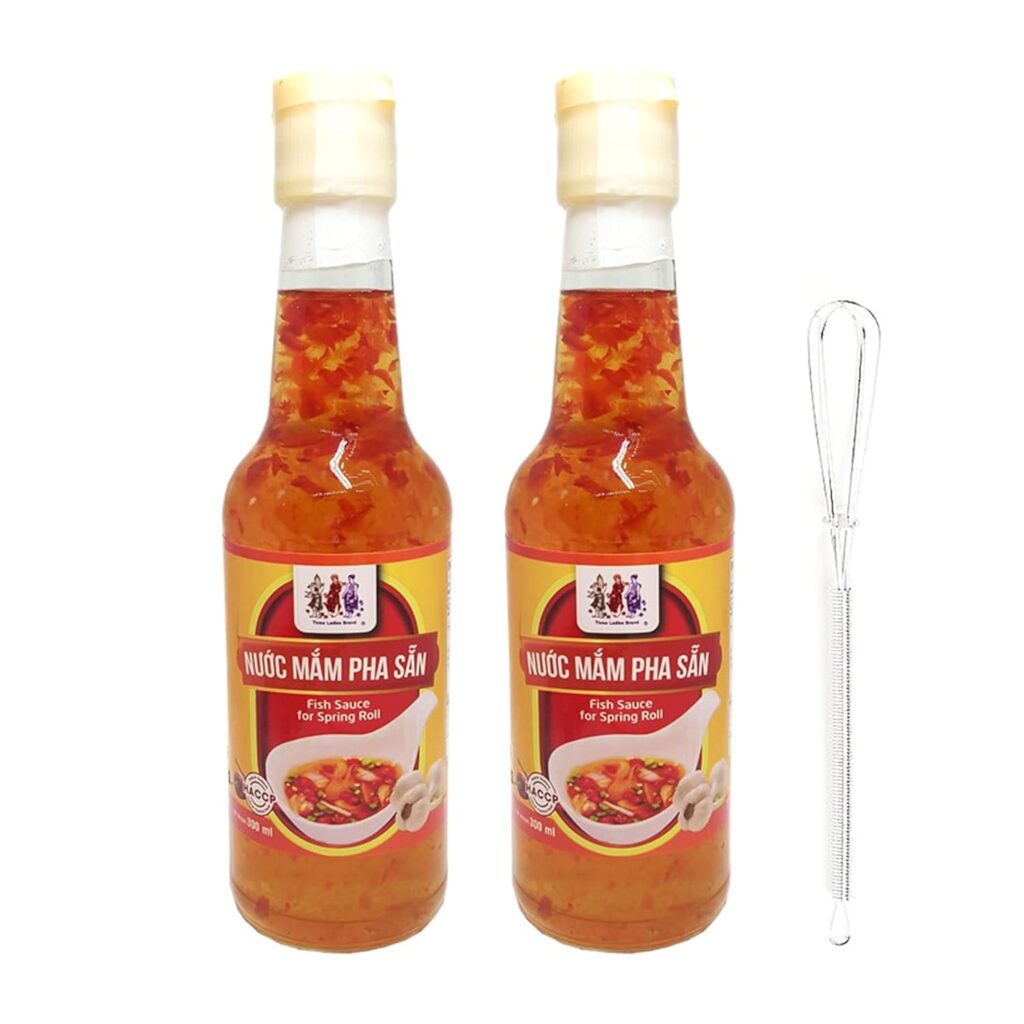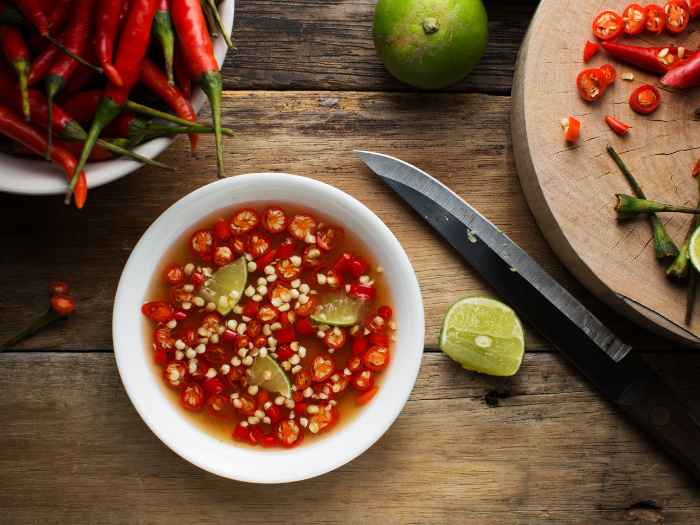Fish sauce is a potent and unique condiment that plays a pivotal role in numerous Asian cuisines. This complex and umami-rich liquid offers a depth of flavor that can transform ordinary dishes into culinary delights. Whether you’re a seasoned chef or just starting your culinary journey, understanding what fish sauce is and how to use it is essential. In this blog post, we’ll delve into the world of fish sauce, exploring its origins, characteristics, and the diverse ways it can elevate your cooking.
What is Fish Sauce

Fish sauce, sometimes referred to as the “umami bomb” of the culinary world, is a pungent and savory liquid condiment made by fermenting fish, typically anchovies or other small fish, with salt. It is a fundamental element of many Southeast Asian and East Asian cuisines, including Thai, Vietnamese, Filipino, and Indonesian. The production of fish sauce involves several key steps:
- Fermentation: Small fish, such as anchovies, are layered with salt in large wooden barrels or stainless steel containers. The salt extracts moisture from the fish, creating a brine that initiates the fermentation process.
- Fermentation Time: The fish mixture ferments for several months to a few years, depending on the desired flavor and quality. During fermentation, enzymes and beneficial microorganisms break down the fish proteins into amino acids, which contribute to the sauce’s rich umami taste.
- Pressing and Filtration: After fermentation, the liquid is extracted by pressing the fish mixture. The resulting liquid is then filtered to remove impurities and sediments.
The quality and flavor of fish sauce can vary significantly based on the type of fish used, the length of fermentation, and the production methods. Higher-quality fish sauces often have a more refined and nuanced flavor.
What is Fish Sauce Used For
Fish sauce is an incredibly versatile condiment that can be used in a variety of culinary applications. Here are some popular uses of fish sauce:
- Seasoning and Salting: Fish sauce is used to season and salt a wide range of dishes, such as soups, stir-fries, and dipping sauces. Its umami-rich flavor enhances the overall taste of the dish.
- Marinades: Fish sauce can be a key ingredient in marinades for meat, poultry, and seafood. It infuses the protein with a deep, savory flavor.
- Stir-Fries: Adding a dash of fish sauce to stir-fried vegetables and proteins can elevate the umami profile of the dish. It’s a common ingredient in many stir-fry recipes.
- Dipping Sauce: Fish sauce is often used as a dipping sauce for spring rolls, grilled meats, and various finger foods. It adds a delightful saltiness and umami kick.
- Soups and Broths: Fish sauce is a staple in many Asian soups and broths, such as Vietnamese pho. It contributes to the complex and savory taste of these dishes.
- Salad Dressings: Incorporating fish sauce into salad dressings, alongside ingredients like lime juice, sugar, and chili, creates a unique and savory dressing that complements fresh greens and vegetables.
- Noodle Dishes: Fish sauce is used to season noodle dishes like pad Thai and bun cha. It imparts a signature Southeast Asian flavor to these preparations.
- Curries: Many Southeast Asian curries, such as Thai green curry, call for fish sauce to enhance the overall depth of flavor.
- Grilling and Barbecuing: Fish sauce can be part of marinades for grilled or barbecued dishes, providing a savory and salty flavor to grilled meats and seafood.
Substitutes for Fish Sauce
While fish sauce is a unique and irreplaceable condiment, you may find yourself in a situation where you need a suitable substitute due to dietary restrictions, allergies, or simply the unavailability of fish sauce. Here are some alternatives that can provide a similar umami-rich depth of flavor:
- Soy Sauce: Soy sauce, especially the dark variety, can be used as a substitute for fish sauce in many recipes. It offers a salty and savory profile, although it lacks the distinct fishy aroma. Use it in a 1:1 ratio or adjust to taste.
- Tamari: Tamari is a gluten-free soy sauce that can work as a fish sauce substitute. It provides a rich, savory flavor similar to soy sauce and is an excellent choice for those with gluten sensitivities.
- Coconut Aminos: Coconut aminos is a condiment made from coconut sap and salt. It’s a suitable alternative for those looking for a gluten-free and soy-free option. It has a mildly sweet and savory flavor.
- Mushroom or Shiitake Soy Sauce: Mushroom-based soy sauces or shiitake soy sauce can offer a unique umami flavor that comes close to fish sauce. These alternatives can be particularly appealing for vegetarian or vegan dishes.
- Anchovy Paste: If you can tolerate fish but don’t have fish sauce on hand, anchovy paste can be a suitable substitute. It provides the same fishy umami kick. Use it in a 1:1 ratio with a bit of water to adjust the consistency.
- Seaweed or Kelp-Based Sauce: Some seaweed or kelp-based condiments can provide a sea-like umami flavor that resembles fish sauce. Look for these products in specialty stores or online.
- Sauces with Umami: Worcestershire sauce or Maggi seasoning sauce can add a similar umami kick to dishes. While not identical to fish sauce, they can impart a depth of flavor to your cooking.
- Salt and MSG: In a pinch, a combination of salt and monosodium glutamate (MSG) can help provide the savory notes that fish sauce offers. However, this alternative lacks the specific fishy aroma of fish sauce.
When using a substitute for fish sauce, consider that the flavor may differ from traditional fish sauce, so it’s essential to adjust and taste as you go. The choice of substitute will depend on your dietary preferences and the specific requirements of your recipe. While nothing truly replicates the distinct taste of fish sauce, these alternatives can still bring a savory and umami dimension to your dishes.
Conclusion
Fish sauce is an essential condiment that has left an indelible mark on the culinary traditions of Southeast Asia and beyond. Its unique and complex umami flavor is prized by chefs and home cooks alike for its ability to transform dishes into flavorful masterpieces. Understanding what fish sauce is and how to use it opens the door to a world of culinary possibilities. So the next time you’re exploring Southeast Asian cuisine, don’t hesitate to reach for a bottle of fish sauce to enhance the depth and complexity of your dishes. Experiment with this ingredient whether you’re preparing traditional Asian dishes or adding a touch of umami to your own culinary creations.





